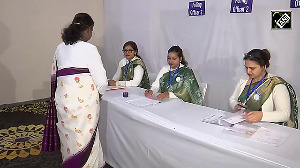Is IIM, Ahmedabad trying to get itself a new image? A year ago the blue chip management school found itself labelled elitist by former HRD Minister Murli Manohar Joshi. Now it may be trying to make amends.
In the past two months, IIM-A has displayed a social conscience with a vengeance. It has lined up a host of education and social initiatives, including tie-ups with other institutions, and made a concerted effort to identify innovators and entrepreneurs.
For starters, it wants to research and submit recommendations to the Indian government for better rehabilitation of the Gujarat riot victims. Anil Gupta, professor of agribusiness at IIM-A along with two of his colleagues, Pankaj Chandra and Rakesh Vasant, has a proposal -- 'Rehabilitating riot victims: Can training, tools and technology help?'
According to Gupta, this initiative is not only meant for the state, but is part of a long-standing solution for proper rehabilitation of communal violence victims across the country.
A grandiose proposal? IIM-A's academics don't think so. "It is our social commitment," says Bakul Dholakia, director, IIM-A. Faculty members argue that book knowledge is not enough and that victims should be provided opportunities in technical education.
"Going through technical education and earning a diploma would not only ensure their professional security and means to earn their livelihood, it will also help them to think logically and rationally," adds Gupta.
Recently, it signed a memorandum of understanding with the Indian Institute of Technology, Delhi to revive its Centre for Innovation, Incubation & Entrepreneurship.
This is to promote small and informal innovators and encourage industries to use their concepts. "We want to promote the cause of the innovators in a larger way," says Dholakia.
Set up in 2001, CIIE progress wasn't much to write home about. It was largely an idea. Now, there are plans to set up a unit to house CIIE and the innovators and their innovations, to ensure interaction between the innovators and the industry.
"Innovation and entrepreneurship play a critical role in industrialisation and economic development. Management institutes should therefore also focus on encouraging innovation and producing entrepreneurs," adds Dholakia.
Then it is wooing corporates to sponsor some sectors, which are the flavour of the season. IIM-A has tied up with the European insurance major Aviva to set up a centre for insurance research in Ahmedabad.
The first of its kind in the country, apart from study and research, the centre will also undertake research in policy making, to provide regular suggestions to the regulatory bodies like the Insurance Regulatory and Development Authority.
In a similar capacity is a centre of retailing, to be set up with the country's largest fast moving consumer goods major -- Hindustan Lever. The objective? To exploit and enhance the existing intellectual capital engaged in retailing, and to augment interaction between academia and industry.
The centre will be kicked off in November. HLL will pay Rs 15 lakh (Rs 1.5 million) every year for five years for setting up the infrastructure for research and data creation.
"The mission will be to generate and disseminate knowledge on the management of retailing with the object of importing management practice to improve the efficiency and the quality of delivery of products and services for the end consumer," says IIM-A director, Bakul Dholakia.
It will also develop teaching and training materials, which will aid post-graduate students who take retail management as one of their elective subjects.
Then, it is finalising plans to help the Egyptian government to set up a management institute in Cairo. And what does IIM-A bring to the table? It will share its expertise including loaning out faculty.
Last year, the Egyptian government had approached IIM-A to replicate its Ahmedabad experience, after having sent a proposal to the then prime minister A B Vajpayee.
Meanwhile, the IIM-A dean, Indira Parikh visited Cairo for meetings with the Egyptian government. Having acquired the centre's go-ahead in August, it was approved by the IIM-A board last month. Only the modalities are to be worked out.
Clearly, IIM-A wants to leverage all opportunities. In December, the government of Gujarat decided to divest its stake in some 12 public sector undertakings. The state's chief minister Narendra Modi instructed his officials to zero in on an agency, which could help it achieve its goals.
Predictably, IIM-A was chosen. Senior faculty member Ravindra Dholakia will head a committee of senior bureaucrats of the state government to help formulate the disinvestment policy.
Why is IIM-A doing all of this? Why is it developing a social conscience? Last year, with the leakage of the Common Aptitude Test (CAT) papers (the scores are essential for entry into business schools), the feud between the government and the IIMs was out in the open.
Allegations and counter-allegations flew from both sides. The union HRD minister, who always claimed that the IIMs were elitist institutions, had ordered a fee cut at the IIMs, alleging that the institutions were sitting on a pile of funds by charging huge fees.
He claimed that the IIMs were only interested in using funds to promote their own status without contributing to the country and education at large.
The IIMs, in turn, had lashed out saying that they were constantly providing loans to needy students and waiving off fees in some cases.
"All this did make a dent in the brand equity of the IIMs. This was their chance to show the world that they could think out of the box. That's why IIM-A is displaying a social conscience and also making an effort to propagate education," says an ex-IIM professor.
Dholakia does not buy this. He claims that IIM-A new initiatives are not driven by revenue. "We are not earning a single penny from CIIE and working for the incubatees and innovators. This is purely a way to show our social commitment," he explains. Last fiscal, IIM-A had a corpus of Rs 98 crore (Rs 980 million).
Another factor for this change is the growing competition. Already Harvard Business School and other American Ivy League colleges have announced plans to reach out to Indian students. Some of them, even want to open schools here. And the industry-sponsored Indian Business School in Hyderabad, is only adding to the IIMs' woes.
Dholakia says that all this will provide tremendous learning opportunities not just for students but its faculty as well. Now, this is something that the IIMs can do with.






 © 2025
© 2025